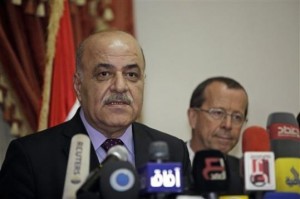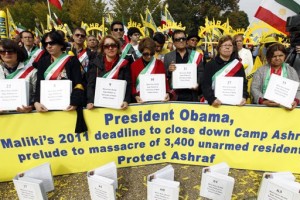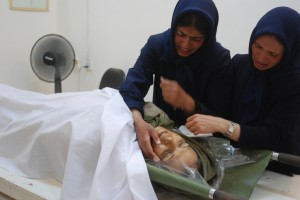 On Wednesday, Democrats and Republicans on the House Foreign Affairs Committee unanimously approved harsher penalties against Iran, citing the regime’s plot to assassinate Saudi Arabia’s ambassador on American soil.
On Wednesday, Democrats and Republicans on the House Foreign Affairs Committee unanimously approved harsher penalties against Iran, citing the regime’s plot to assassinate Saudi Arabia’s ambassador on American soil.
This latest Iranian provocation signals an alarming escalation by a terrorist regime that has been complicit in killing U.S. soldiers through its proxies, the Taliban in Afghanistan and Shia radicals in Iraq.
What evil can we expect next from the Mullahs’ brutal regime?
In a word, the wholesale slaughter of 3,400 unarmed Iranian dissidents whom the U.S. government has sworn to protect…a looming humanitarian catastrophe we are honor-bound to prevent.
There’s no doubt that December 31 will be especially joyful this year; a time when families across our country can welcome home the last remaining sons and daughters who fought bravely in Iraq.
But December 31 will also mark the illegal and arbitrary deadline set by Iraqi Prime Minister, Nouri al-Maliki, at Tehran’s direction, for closing Camp Ashraf and dispersing its residents throughout the country– where they can be tortured or killed quietly out of sight of the international community. This is hardly the “successful” conclusion of the nine-year military intervention in Iraq that Americans will want to remember–or that the American president will want to claim as his legacy in an uphill re-election campaign.
Camp Ashraf, Iraq is home to members of the Mujahedin-e Khalq (PMOI/MEK) who are “protected persons” under the Geneva Convention.
The MEK is the principal Iranian opposition movement and it is committed to non-violent regime change and a democratic, nuclear-free Iranian future.
During the past 25 years, this community has transformed Ashraf from a barren piece of land into a modern, vibrant town with universities, libraries and convention centers, parks, pools, and sports facilities. The Mullah’s in Iran consider MEK an existential threat and have vowed to annihilate its members in Camp Ashraf at all costs.
In 2004, the United States gave each and every man, woman, and child living in Camp Ashraf, a written guarantee of protection until they could be relocated safely. But since early 2009, when the U.S. handed over the camp to the Iraqis, Ashraf has been under a suffocating siege. Residents have been subjected to psychological torture and deprived of basic necessities including access to medical services.
Twice — in July 2009 and in April 2011 — defenseless Ashraf residents were brutally attacked by Iraqi troops acting on Tehran’s orders. The result was 36 dead, including eight women, and over 300 injured. And that was while US troops were in the country! Imagine what will happen when the U.S. military presence in Iraq is removed.
Seeking to extend its influence in the region, Iran will most assuredly exploit President Obama’s decision to leave Iraq without any U.S. military presence. And the opportunity to forge a deeper alliance with Iraq finds a willing partner in Nouri al-Maliki who has flouted international outrage over his actions with respect of Camp Ashraf.
In an ominous development earlier this week, Iraqi military and police units in humvees and trucks entered Camp Ashraf around midnight, sounding their sirens and brandishing their weapons in a calculated effort to intimidate and terrorize the residents.
Maliki’s previous attacks on Camp Ashraf were roundly condemned by The Secretary of State, the UK Foreign Office, the EU High Representative, the U.S. Congress, the U.N. High Commissioner for Human Rights, and international human rights groups such as Amnesty International.
Senate Foreign Relations Committee chairman John Kerry described the raid a “massacre,” calling for a thorough, independent investigation, and emphasizing that Iraqis must refrain from any further military action against Camp Ashraf.
When, shortly thereafter, the European Parliament offered a long-term, peaceful solution to the crisis wherein Ashraf residents would be peacefully evacuated and re-settled in EU member states and other countries (including the US), the Iraqi foreign minister prevented a European Parliament delegation from visiting the Camp.
In June, a senior bipartisan delegation of the House Foreign Affairs Committee also travelled to Baghdad to see Camp Ashraf investigate the April 8th massacre. The Congressmen met Iraqi Prime Minister Nuri al-Maliki. Once again, access to the camp was denied. The delegation held a press conference in the US Embassy after the meeting and called the Ashraf raid a “crime against humanity.”
The need for intervention by the US, EU and U.N. is urgent. American taxpayers, who are funding 27% of the annual U.N. budget for peacekeeping, should demand that the international organization immediately dispatch blue helmet forces to safeguard the unarmed men, women, and children in Camp Ashraf.
In his 2009 Cairo address, President Obama promised a new chapter in U.S. relations with the Muslim world. Make no mistake about it, America’s inaction in the face of a Srebrenica-style massacre at Camp Ashraf will leave an indelible stain on Muslim-U.S. relations–one that will not be easily forgotten or forgiven in the Muslim world.
The amendment to the Iran Threat Reduction Act of 2011 that was unanimously adopted yesterday in the House Foreign Affairs Committee calls on the Obama administration to pressure Iraq to ensure the safety of the camp residents, prevent their involuntary return to Iran, and delay closing the camp until the U.N. High Commissioner for Refugees can resettle them in another country.
Clearly, the United States has a moral and legal duty to uphold the promises it made to the residents of Camp Ashraf, Iraq. To do otherwise would hand Iran a victory, seriously damage American credibility throughout the world and lead to a humanitarian disaster that must be prevented.
Howard Dean is the former Democratic governor of Vermont. He served as chairman of the Democratic National Committee from 2005-09. Tom Ridge is the former Republican governor of Pennsylvania. He served as our country’s first Secretary of Homeland Security in the administration of President George W. Bush.
Read more: http://www.foxnews.com/opinion/2011/11/03/whats-next-for-iran



